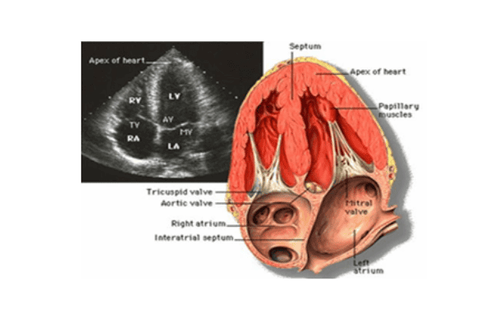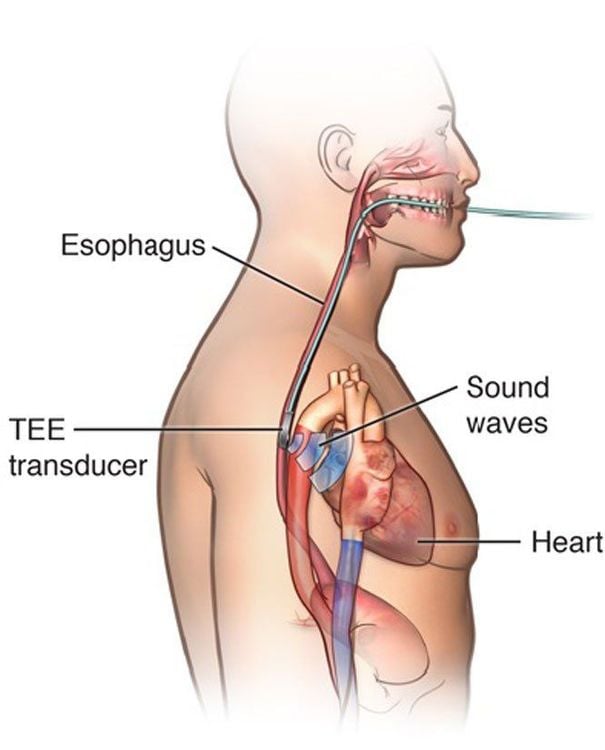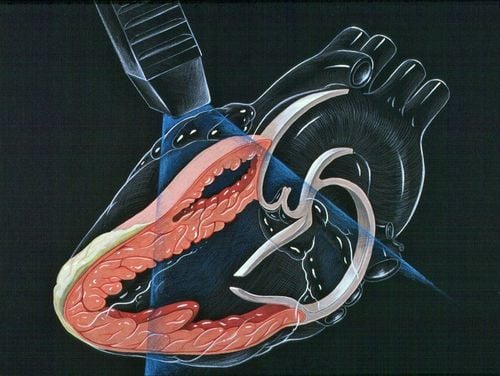This is an automatically translated article.
The article is professionally consulted by Master, Doctor Tong Diu Huong - Radiographer - Department of Diagnostic Imaging - Vinmec Nha Trang International General Hospital. The doctor has more than 10 years of experience in the field of in-depth imaging of diseases on images of Ultrasound, X-ray, multi-slice CT, Magnetic Resonance.Echocardiography is one of the important methods used to check for abnormalities, diagnose heart conditions, etc. Depending on the information the doctor needs, the patient may need to do one of many things. type of echocardiography.
1. What is echocardiography?
An echocardiogram is a diagnostic test that uses high-frequency ultrasound waves (ultrasound) to obtain dynamic images of the heart and related structures. This is a non-invasive technique that does not use radiation and has rare side effects.The following types of echocardiography are available:
Transthoracic echocardiography Transesophageal echocardiography Doppler echocardiography Three-dimensional echocardiogram Stress echocardiography Fetal echocardiography
Trắc nghiệm: Huyết áp của bạn có đang thực sự tốt?
Huyết áp cao hay thấp đều ảnh hưởng đến tình trạng sức khỏe con người. Để biết tình trạng huyết áp của bạn có thực sự tốt không, hãy làm bài trắc nghiệm sau đây để đánh giá.2. What abnormalities does echocardiography detect?
With ultrasound, the doctor can see the structure of the heart; how the heart works, contracts; heart size, heart shape; size and movement of the heart walls; the functioning of the heart valves,...With this information, the doctor will be able to detect and diagnose problems encountered in the heart such as:
Diseases of the heart valves: stenosis, regurgitation This is a type of disease that occurs when the structure of the valve leaflets is deformed, the heart valve does not close properly, blood flows back into the heart chambers. Changes in heart size: High blood pressure or other diseases can cause the chambers of the heart and heart muscle to grow abnormally in size. Heart muscle damage: An echocardiogram helps doctors detect and diagnose abnormalities in the ejection process. Helps to diagnose and prevent dangerous complications from prolonged myocardial necrosis such as acute myocardial infarction. Heart defects: Echocardiography can identify congenital heart abnormalities in infants and young children. Pericardial effusion: Pericardial effusion is a common manifestation of primary or secondary pericardial disease due to a pathological process of the body. The severity depends on the condition. If left untreated, pericardial effusion can cause heart failure. Monitor treatments for heart conditions: Monitor how your heart responds to various heart treatments such as heart failure medications, artificial valves, and pacemakers.

3. When is an echocardiogram needed?
Your doctor will ask you to have an echocardiogram for a variety of reasons, for example when cardiac abnormalities are detected on other tests, or signs of heart disease, or auscultation with a stethoscope.In addition, if the patient has suspected heart-related problems accompanied by the following symptoms, they should see a doctor for a timely echocardiogram:
Dizziness, dizziness, headache, regional tightness chest. Shortness of breath, irregular heartbeat, sometimes fast and sometimes slow. Suspected heart disease because a family member has a history of heart disease. When doing heavy work, the heart beats fast and choking hard to breathe. There are people who have pain in the left shoulder, arm pain, neck pain, back pain or pain in the jaw, you should also go for an echocardiogram because this is also a symptom. symptoms of ischemic heart disease.
4. Attention when conducting echocardiography?
During ultrasound, the patient does not need any special preparation before performing the ultrasound. With conventional echocardiography, the patient does not need any special preparation but can eat and drink as usual. If you have a stress echocardiogram or a transesophageal echocardiogram, your doctor may ask you not to eat for several hours. Each ultrasound technique has different functions and uses as follows:Stress ultrasound: When the doctor conducts an electrocardiogram, or gives the patient a drug that can make the heart beat faster and stronger. Doppler ultrasound is indicated to measure blood flow velocity at locations in the heart chambers. Transesophageal ultrasound: The patient must swallow a transducer with a thin fiber optic cable connected to the ultrasound machine.

Treatment depends on what the doctor finds on the physical exam, the specific signs and symptoms in the patient.
To protect heart health in general and detect early signs of myocardial infarction and stroke, customers can sign up for Cardiovascular Screening Package - Basic Cardiovascular Examination of Vinmec International General Hospital . The examination package helps to detect cardiovascular problems at the earliest through tests and modern imaging methods. The package is for all ages, genders and is especially essential for people with risk factors for cardiovascular disease.
Please dial HOTLINE for more information or register for an appointment HERE. Download MyVinmec app to make appointments faster and to manage your bookings easily.














